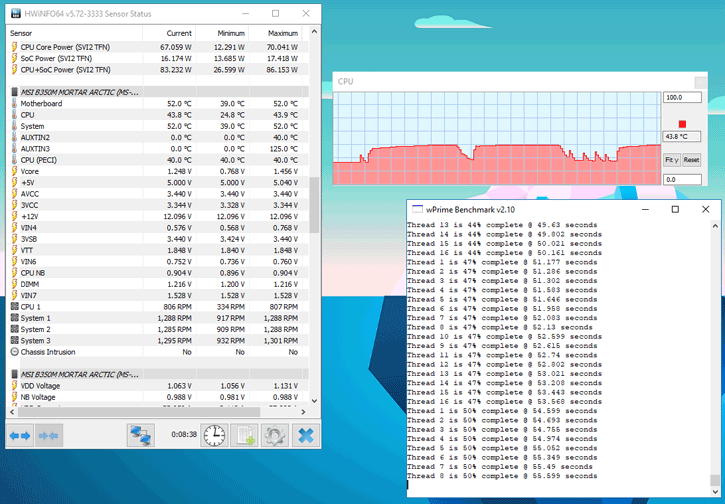Pushing the cooler
Pushing the cooler
Here, we will test the system the unit is installed in under a variety of overclocked and stock conditions, in order to measure how well the unit holds up against an overclocked CPU. We will also be covering noise later, both at stock and overclocked. We will, therefore, be considering the following three factors:
- System noise levels at stock and with a CPU overclock.
- Thermals with the CPU at stock settings (aka. as set to 'automatic' in the BIOS.
- Thermal performance with the CPU overclocked.
For the overclock, the test system is using AMD's latest platform, Ryzen Summit Ridge (aka. Ryzen '1'). The CPU in question is an R7 1700X Octa-Core processor. The motherboard is a mid-level MSI B350M Mortar 'Arctic'. The B350 chipset supports overclocking, and is the 'mainstream' choice for all those wanting to get into AM4 without shelling out the extra dollar for the more expensive X370 (and upcoming X470) chipsets.
Some may wonder why we have chosen Ryzen to test with? Well, plenty of people adopted Ryzen CPUs, and we, therefore, reflect this in using one for our tests of this cooler. It's also appropriate given the potential strain a well overclocked 8 core/16 thread CPU will put on any cooler, AIO or not. This is especially considering the CPUs stock 95W TDP, which matches that of the 'gaming king' Intel Core i7 8700k. Within reason, then, if the cooler performs well on the 1700X, then it is a reasonable assumption that it will also perform reasonably well on the 8700k or 8600k.
The overclock in question will be with the 1700X operating at a fixed 3.8Ghz at 1.31v on the VCore, and 1.15v on the SOC voltage. The latter does actually affect CPU core temperatures, so it is worth mentioning. Whilst I could certainly blast the CPU with a full 1.425v (stated by AMD as the absolute max for safe 24/7 operation, assuming safe temperatures), this 1700X also happens to be my actual 1700X, so blowing it up or damaging it via overheating isn't in my list of things to begin 2018 with. This motherboard also happens to be my motherboard...
The stress tester
We follow a set protocol when testing CPUs. The stress test in question is wPrime, using the 1024 data set. The wPrime benchmark is allowed to run three times in a row (in order to 'saturate' temperatures), as AIOs can take a while to equalize. Ryzen CPUs will automatically trigger a shutdown if they hit 95C on the package, but we do not expect the CPU to get anywhere near that level today.
Below, you can see an example of a test run we did when the system was overclocked. As core temps can vary fairly wildly, we measure the maximum rated 'package' temperature, using HWInfo. You can see that the CPU is operating at 3.8Ghz using the stated 1.31v.
In the next couple of pages, you'll also see the results garnered from using my regular Noctua cooler, the venerable NH-U12S. It is a single tower 120mm cooler with a strong emphasis placed on the quietness of operation. It's an appropriate comparison, as everything about the Celsius S24 - thus far - has been with a move toward quietness, and perhaps the best example of that is the fan specification of the included fans. This head to head is aimed at giving you an idea of the potential performance difference between two products both aimed at quietness, though taking markedly different approaches.


